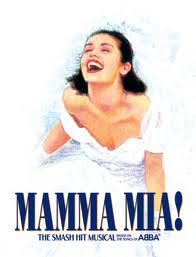Mamma Mia!

There is the possibility that the curtains at the Cultural Center of the Philippines, where Mamma Mia is scheduled to run starting tomorrow, will not go up if the local association of Filipino singers, the Organisasyon ng Pilipinong Mang-aawit makes good its threat to secure an injunction or a temporary restraining order against the local promoters of the show for allegedly not paying equity clearance.
In fact, Elmar Beltran Ingles, Executive Director of OPM has issued a more ominous threat: OPM President singer Ogie Alcasid plans to bring up the matter directly with the President of the Republic of the Philippines himself, Benigno Simeon Aquino III. Oh, President Aquino is bound to listen regardless of how busy his schedule is or how preoccupied he is with impeaching the Chief Justice of the Supreme Court. Alcasid and his wife, popular singer Regine Velasquez not only campaigned heavily for Aquino in the 2010 elections, the couple wrote and performed the song that launched off Aquino’s campaign.
And Kris Aquino, who by the way, may not be a member of the OPM, but is a certified gold record recipient many times over for her “inspirational albums”—where she wears her heart on her sleeve and regurgitates what she passes off as profound words of wisdom—could always intervene and ensure that Alcasid and OPM members would get the justice they think they deserve.
Foreign artists who perform in the Philippines including back-up singers and dancers are required to pay “equity” to the local associations. This set-up is observed in most countries because, theoretically, local artists are displaced and lose opportunities to make a living every single time a foreign artists goes up a stage to perform. Filipino artists who are not members of, say the unions in the United States, are also required to pay equity every time they perform on Broadway. There was a major controversy when Lea Salonga and Jonathan Price reprised their roles in Miss Saigon on Broadway precisely because of equity issues.
The local promoters of Mamma Mia insisted that they have already secured a special permit from the Bureau of Immigration for the performers. Ingles refuted the assertion. The amount OPM imposes on foreign artists is quite steep—P5,000 per performer per show. For a production such as Mamma Mia that runs for four weeks and which has a cast of dozens, the equity clearance fee is nothing to sneer at. What makes the issue a little more intriguing though is the fact that OPM supposedly required the Mamma Mia production to pay double because “December to February is peak season for local shows.” This makes the whole thing seem like a case of extortion and bullying.
But first of all, why is the OPM the one collecting equity clearance fees on the actors of Mamma Mia? Shouldn’t it be the theater artists group that should be collecting and benefitting from the fees?
And someone please tell me OPM did not really say they use the money they collect from equity fees to pay for the “medical fees and other emergency expenses of singer members.” They make it sound like mendicancy, or worse, a mafia-like arrangement.
I am a zealous supporter of Filipino artists and local productions. I make it a point to watch most, if not all local musical and stage productions because I think Filipino artists are among the best in the world and deserve every support they can get.
However, I am against extortion under the guise of protectionism. Protectionism in the arts is already in itself a highly debatable concept particularly at a time when local artists are already making a name for themselves globally. For crying out loud, how do we expect to raise the standards of performing arts in this country and that of our artists if we isolate ourselves from the global artistic community?
And then there’s the matter of costs being passed on to the audience! OPM gets a fat check, but at whose expense? No wonder ticket prices to foreign acts are prohibitive in this country! Do you know how much good seats in Mamma Mia cost? They are beyond the reach of ordinary people in this country.
Please spare me the sob story about how local artists and local productions are forced to hobble along begging for sponsorships and practically doing cartwheels to get an audience for their shows. I know the drill. But OPM, Alcasid and company can use their influence to compel the government to give arts the necessary support. There’s a long list of woes and grievances that local artists know by heart—they basically subsist on, as a local director impudently quipped, Skyflakes and catfood. But how exactly does extorting from foreign acts help their cause in the long run?
If we are serious about raising the standards of local productions and helping local artists, we need to help ourselves and start the process from within.
The truth is that the music industry is dying because of a confluence of factors, but the local artists cannot wash their hands of their involvement in the slow death of the industry. Given the kind of collective output the industry has produced in the last two decades, what the heck are they expecting? Most of the stuff we have been hearing in the last decade are covers of music written by foreign artists. And we are already scraping the bottom of the list of hits from the seventies and eighties. At the rate we are going, it’s just a matter of time before American country music also get repackaged to suit local taste.
We can fight for our rights, but we need not be opportunists and extortionists in the process. Mamma mia, talaga!

Comments